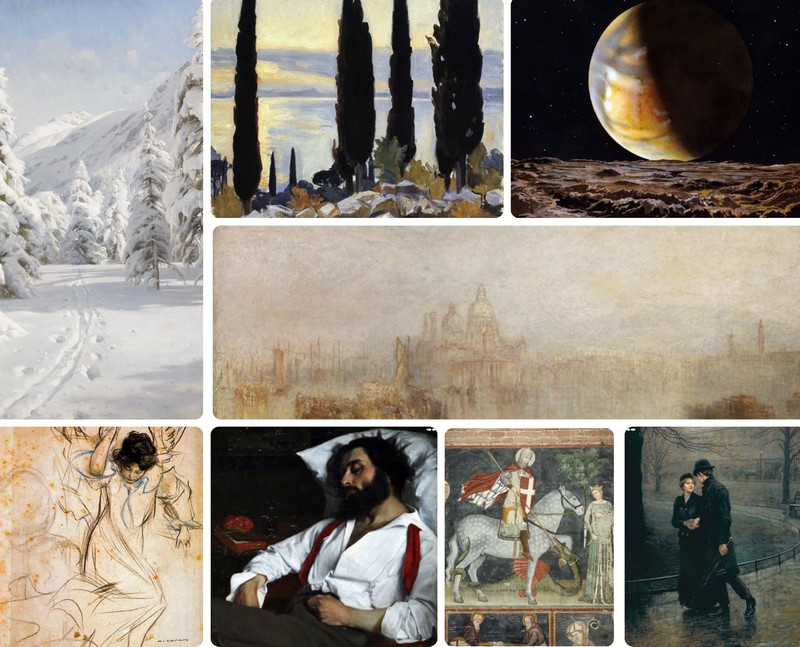
My dearest, this week we are blowing thirteen candles, for the thirteen years that have passed since I published the first entry of Liederabend on February 2, 2012. Thank you for being there, for reading, and for commenting. I'm happy to keep learning and sharing, knowing that you're on the other side of the screen.
As is customary, we review the figures from the previous year. We have listened to fifty-five songs, and we have added nine composers, nineteen poets, nineteen singers and twenty-one pianists to the lists. This is how we obtain the title figures, accumulated over thirteen years: 702 (songs) – 155 (composers) – 282 (poets) – 293 (singers) – 284 (accompanists).
I share these numbers with you every year, although I understand that for you, they are only an anecdote (and a tempting title). It is useful for me because it is a kind of blogger self-examination; once a year, I stop to see what I have done because perception does not always correspond to reality. In the first days of September, between the end of the Schubertíada and I’m going on holiday, I start the notebook for the new season, which I always buy in July thinking that I will have time to do it in August (I'm naïve, I know). I take note of every Wednesday of the season and mark the designated dates, such as Christmas, Easter, anniversaries, etc. I also review the list of songs that have been noted as “for someday”. But I do not include anything else in the calendar, this is all the planning I do; the ideas appear week after week, in a recital, listening to an album, in a conversation, for a request, or occasionally looking at the list that I said to you previously. For example, I have two posts planned after this one at the moment.
Since there is no pre-planning of the season, the only way to know what I've done for a year is to revisit it afterward, and timing it to coincide with the anniversary is a way to avoid forgetting. Sometimes things are unexpected. For example: I had the impression that I had introduced many new composers this year, but they are only nine, three less than last year. With a total of ten songs, most of them have gone on to expand the list of sole composers.
Why would I have that feeling? Perhaps because I felt that I had shared a few songs from the most frequented composers. And this was true: five songs by Schubert, five by Schumann, four by Brahms, three by Wolf, one by Strauss and (to my horror) none by Mahler. Considering this, I wanted to see how I had distributed the remaining half of the songs, in case I had missed any favouritism: except for Liszt, who has three songs, the rest of the composers have one or two. And some have dropped off the list of “sole” composers.
As you can see, everything is very placid, and maybe the novelty this year is that there are no novelties. A year ago, I mentioned a series I was preparing for; I have not made much progress and I don't dare to promise anything. However, I have been feeding the series, The same poem, one more song, which I like very much and, since it is open, it is easier. And, as part of this review, I have changed the ephemeral cover of the website. Of course, we now have it dedicated to Dietrich Fischer-Dieskau.
He will also be the one who will put the icing on the birthday cake, with a Mahler Lied (and so I repair a little of my oblivion lately). The recording of the Lieder eines fahrenden Gesellen [Songs of a Wayfarer] by Dietrich Fischer-Dieskau and the Philharmonia Orchestra conducted by Wilhelm Furtwängler in 1952 is magnificent. We listened to the last song a long time ago and this week I suggest we listen to the first one, Wenn mein Schatz Hochzeit macht [When my darling has her wedding-day]. The poet, Gustav Mahler, who draws inspiration from Des Knaben Wunderhorn’s poems, tells us about the distress he will feel when his beloved gets married. We are talking about a nice cycle of youth, Mahler composed it at his twenty-five, while the interpretation of a young singer of twenty-seven is still a reference. I hope you enjoy both the song and the performance so much that you review the full cycle.
Wenn mein Schatz Hochzeit macht,
Fröhliche Hochzeit macht,
Hab' ich meinen traurigen Tag!
Geh' ich in mein Kämmerlein,
Dunkles Kämmerlein,
Weine, wein' um meinen Schatz,
Um meinen lieben Schatz!
Blümlein blau! Verdorre nicht!
Vöglein süß! Du singst auf grüner Heide.
Ach, wie ist die Welt so schön!
Ziküth! Ziküth!
Singet nicht! Blühet nicht!
Lenz ist ja vorbei!
Alles Singen ist nun aus.
Des Abends, wenn ich schlafen geh',
Denk' ich an mein Leide.
An mein Leide!
When my darling has her wedding-day,
her joyous wedding-day,
I will have my day of mourning!
I will go to my little room,
my dark little room,
and weep, weep for my darling,
for my dear darling!
Blue flower! Do not wither!
Sweet little bird - you sing on the green heath!
Alas, how can the world be so fair?
Chirp! Chirp!
Do not sing; do not bloom!
Spring is over.
All singing must now be done.
At night when I go to sleep,
I think of my sorrow,
of my sorrow!
(translation by Emily Ezust)
















